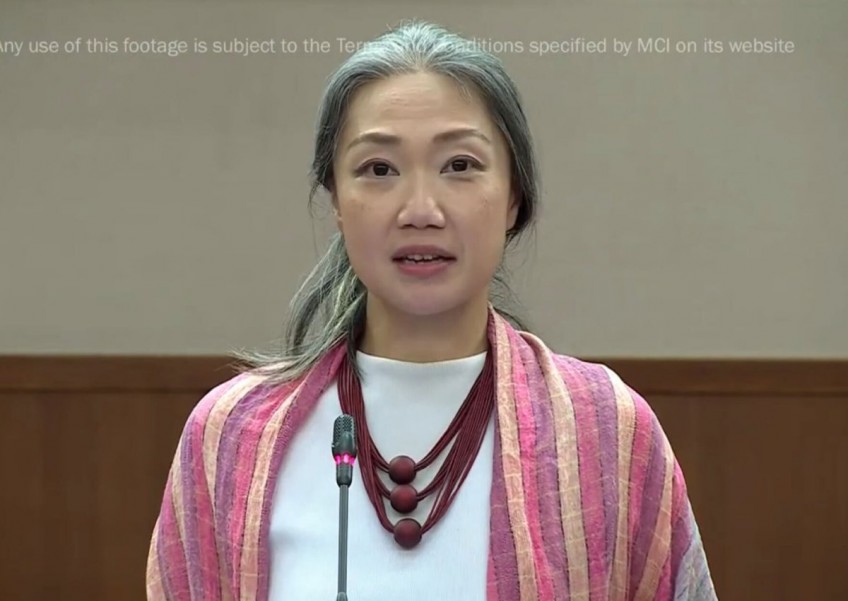'Love, at that time, felt rather transactional': MP Carrie Tan wondered if her parents used her as 'insurance' for their later years


 PUBLISHED ONJuly 05, 2023 5:46 AMByChing Shi Jie
PUBLISHED ONJuly 05, 2023 5:46 AMByChing Shi JieWhen Carrie Tan (MP for PAP-Nee Soon) was growing up, she wondered if her parents were using her as "insurance" for their later years.
"The old Chinese saying 'yang er fang lao' (raise children to support your old age) is a phrase I used to hear from my mum and other adults around me as I was growing up," the 41-year-old recounted in Parliament on Tuesday (July 4).
"I remembered feeling rather disturbed as a child hearing this… It made me wonder if the value of me was just to be an insurance for my parents when they grow old," she shared.
"It didn't help with building up a strong sense of self-worth and it made me doubt if my parents really do love me for who I am. Love, at the time, felt transactional."
Admitting that she's not ashamed of having such thoughts in the past, the Member of Parliament shared that like "many people in her generation", she believed in filial piety since caring for one's parents "is the right thing to do".
"[But] We do not place the same expectation on our children to do the same," she said.
Tan was one of the MPs who spoke in Parliament yesterday during the second reading of a Bill that proposed changes to the Maintenance of Parents Act (MPA).
The Bill was passed in Parliament on the same day.
Passed in 1995 and last amended in 2010, the Act allows seniors who are unable to provide for themselves to claim maintenance from their children who are capable of supporting them, but are not doing so.
One of the key changes to the Act will be the enhancement of protection for destitute elderly parents, by getting the children to attend conciliation and discuss care arrangements.
Speaking in Parliament yesterday, MP Seah Kian Peng, who led a workgroup of nine MPs to review the Act, shared that the Commissioner for the Maintenance of Parents will be empowered on his own motion to have the children attend mandatory conciliation.
This is so that care arrangements for the parents can be discussed and the children can be reminded that they have the legal obligation to support their parents, Seah added.
"The MPA is not intended to legislate or enforce filial piety, but to ensure that children provide for their needy elderly parents at a basic minimum level," he said.
But Tan admitted that she was sceptical when she first learnt of this amendment.
She said: "My initial reaction was, really? Do we really want to allow the state to request maintenance from children without the consent from the parents? Is this something that we really want to step in on?"
So, what led to a change in perspective? Tan shared that being part of the workgroup to review the MPA helped her to "understand the issues more deeply".
She said in support of the Bill: "I began to discover that my personal idealism for unconditional love is indeed just an ideal, and not very practical when we consider what it means for the larger society.
"I realised that this matter is not about whether the state is so stingy that it's unwilling to support the upkeep of those who are vulnerable and destitute."
To Tan, the proposed change to the MPA addressed "the matter of fairness".
"What I saw in reality is that many elderly parents prefer not to impose this burden [of caring for them] on their children," the MP said.
There are also occasions where parents continue to leave their assets to their children, she added.
"[They] are caught in a 'gift and give' mindset… These encounters show me that in many cases parental love doesn't ask for returns. Love often is indeed unconditional."
While the amendments to the MPA strengthen provisions for parents, there are new measures which also prevent misuse of the law, said Seah.
Elderly parents who are seeking monetary support from their children will have to declare if they have had any record of abusing, abandoning or neglecting their children in the past.
If there is such a record, the Tribunal for the Maintenance of Parents may not allow them to apply for maintenance from their children.
If the parent had previously abused their children, for example, it may not be just or equitable to order the child to support the parent, Seah said.
Other key amendments to the Act include:
The tribunal can dismiss frivolous or vexatious applications without informing or involving the child whom the parent is asking money from.
This can be done where the existing evidence shows that the application is without merit, for example, the parent is clearly able to support himself, or the child has no means of supporting the parent, for instance, if he is receiving long-term financial aid.
The tribunal can also make any non-monetary orders it deems fit, such as get a parent who is addicted to gambling to attend counselling to deal with the addiction, or order a family to attend family counselling in highly acrimonious cases.
Seah shared that this is in the hope of addressing the root causes of why the child does not want to give maintenance.
The tribunal can also order that maintenance payments be withheld until the parent complies with the non-monetary orders, he added.
ALSO READ: Here's how much monthly allowance Singaporeans give their parents